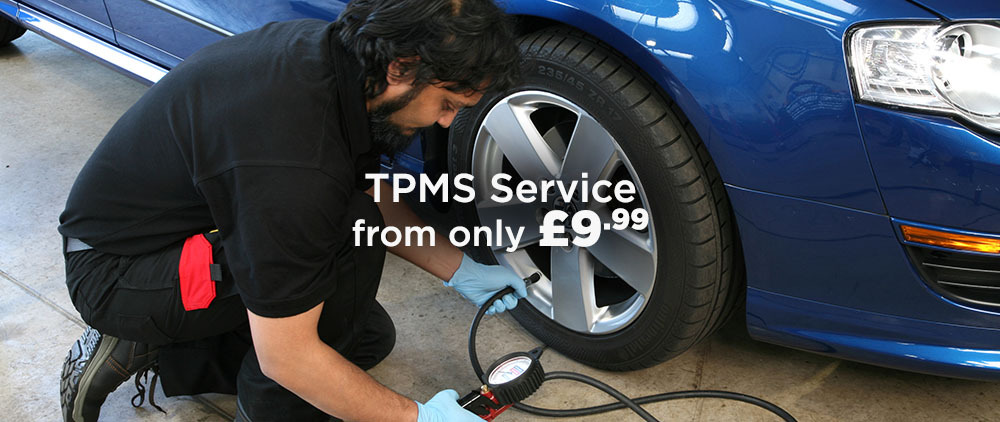
TPMS SENSOR VALVE SERVICE AND REPLACEMENT
Tyre Pressure Monitoring Systems (TPMS) constantly monitor tyre pressures using tyre sensors in all four tyres and alert the driver with a visual and/or audible warning if there is any change in pressure or temperature.
Having TPMS fitted to your vehicle improves your safety as the system checks tyre pressure every few seconds reducing your chance of a blow out or accident related to incorrect tyre pressures. TPMS can also save you money as having the correct tyre pressure maximises tyre life and also helps improve fuel efficiency.
New vehicles fitted with TPMS and registered from 1st January 2012 will also have their TPMS system tested as part of the first MOT test carried out. This means if your vehicle falls into this category and the TPMS is not functioning correctly, you could fail your MOT test.
TPMS
The first Tyre Pressure Monitoring Systems (TPMS) were equipped to premium vehicles in the early 1990s on models such as Mercedes S-Class, 7 Series BMW and the Audi A8 so they aren't new by any means. TPMS are now common fixtures in Peugeot and Citroen models along with many other popular vehicles and it's estimated that by 2013, around 6 million cars in the UK will be TPMS equipped.
What are the benefits to fitting TPMS?
The rationale behind fitting TPMS is to provide an early warning system for the driver when there is a change or loss of tyre pressure. This saves you time and energy in routinely checking tyre pressure manually, as advised by all car and tyre manufacturers for your safety.
Having TPMS improves your safety as it constantly monitors pressure, helping to avoid potential blow outs or accidents linked to a change in tyre pressure.
Having the correct pressure also helps save you money. Incorrectly inflated tyres causes uneven tyre wear and tyres need to be replaced sooner than normal. By having tyres correctly inflated at all times, they wont have to be replaced as often. The correct pressure improves fuel efficiency too, since under inflated tyres mean more tread is hitting the ground, causing friction (this is known as rolling resistance) and so more power - and therefore fuel - is required to drive the car forward. By having the correct tyre pressure, rolling resistance and also the amount of fuel used is reduced, saving you money. This in turn is beneficial to the environment as it cuts down on carbon dioxide emissions too.
TPMS legislation
New EU legislation requires all new models of passenger cars sold in the EU to have a TPMS system installed from November 2012, and every new car from 2014. New vehicles fitted with TPMS and first registered from 1st January 2012 will have their TPMS system tested as part of the first MOT test the vehicle has carried out.
The legislation has been driven by environmental concerns as part of the EUs commitment to reducing CO2 emissions, as well as safer motoring.
TPMS facts and figures
Data analysis shows that a new tyre will leak 3psi - 8psi over a year which results in around a 2% increase in fuel consumption and a 25% reduction in tyre life.
The EU estimates that the under-inflation of tyres is globally responsible each year for:
- 20 million litres of unnecessary fuel consumed
- 2 million tonnes of CO2 emissions
- 200 million prematurely worn tyres
- 9% of accidents involving fatalities
- 41% of accidents involving injury
How does TPMS work?
On the majority of vehicles, TPMS works via a sensor valve fitted in each wheel which sends a low frequency signal to the car's Engine Control Unit (ECU) giving information on tyre pressure and temperature. If the tyre pressure drops by more than few pounds (PSI), the sensor valve is damaged or the sensor valve battery has expired, a warning normally lights up on the dashboard to alert the driver.
Why do TPMS sensor valves need to be serviced?
Sensor valves can be expensive to replace with single units costing anywhere from £45 to £150. Theoretically sensor valves should last for years, but due to wear and tear, corrosion or damage to the valve stem sleeve and nut, valve cap, valve core and rubber grommet which all help to ensure an air-tight seal, the sensor valve can become faulty or even fail prematurely. For these reasons National offer a sensor valve service - this helps extend sensor valve life considerably by the fitment of a new service kit when a new tyre is repaired after a puncture or replaced with a new tyre.
Why do TPMS sensor valves need to be replaced?
A sensor valve normally requires replacing after around 5 years or up to 100,000 miles, although this can vary depending on vehicle use. High mileages and frequent low pressure alerts can reduce this considerably and given the position of the sensor valves in the wheel, they are also vulnerable to damage and corrosion which means they may be required to be replaced sooner.
How does the car 'recognise' a TPMS new sensor valve?
The car's ECU stores the unique identity number of each valve. When a valve is replaced, the new identity number has to be programmed into the ECU. On some cars this has to be done with a diagnostic tool which plugs into the vehicles On Board Diagnostics through a sixteen pin socket usually found under the dashboard (although on some cars it is located elsewhere). On some models the car "self-learns" simply by being driven.
Trust National for TPMS
At National Tyres and Autocare, every branch is equipped with the digital, diagnostic and hand tools necessary to service or replace the TPMS sensor valves on every make and model of car. If you are unsure about anything regarding TPMS, please ask a member of staff who will be delighted to help.


 Sign up for SPECIAL OFFERS
Sign up for SPECIAL OFFERS
